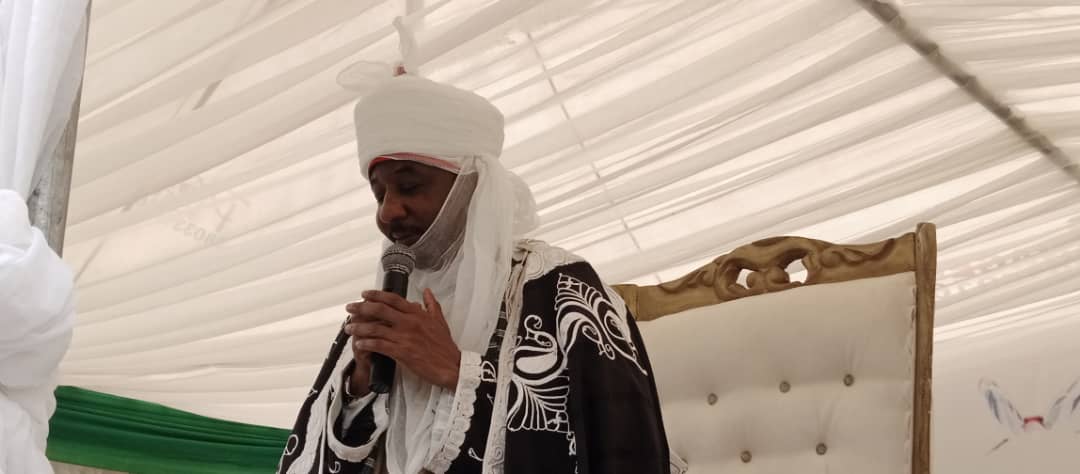GBV: I tell my daughters to retaliate if their husbands slap them –Emir Sanusi
The 16th Emir of Kano, Muhammad Sanusi II, says he always tells his daughters whenever they are getting married that if their husbands slap them, he expects them to return the slap. The emir said wife beating, domestic violence form 45 per cent of cases across nine Shari’a Courts of Kano in five years. He […]

The 16th Emir of Kano, Muhammad Sanusi II, says he always tells his daughters whenever they are getting married that if their husbands slap them, he expects them to return the slap.
The emir said wife beating, domestic violence form 45 per cent of cases across nine Shari’a Courts of Kano in five years.
He made this known at the National Dialogue Conference on Gender-Based Violence (GBV) prevention from an Islamic perspective themed: ‘Islamic teachings and community collaboration for ending Gender-Based Violence’ organised by the Centre for Islamic Civilisation and Interfaith Dialogue (CICID), Bayero University Kano (BUK) in collaboration with the Development Research and Projects Centre (dRPC) with support from Ford Foundation.
The emir said, “You can take that verse and say that as a husband, I’ve been given this permission to beat my wife light. And nobody will deny that, nobody will say it is haram if you comply with all the rules. But if you live in a society in which those rules are never applied, nobody who is angry remembers to look for a chewing stick or a handkerchief.
“They just slap these women and punch them and kick them and beat them. I just wrote a doctorate thesis on family law, and I did research on nine courts, nine Shari’a courts in Kano. 41% of the cases over a five-year period had to do with maintenance. 26 per cent had to do with harm. And out of those, 45 per cent were cases of wife beating, domestic violence. And when we go to the content analysis, not one case of wife beating was light beating.
- Bill seeking to depose chiefs in Adamawa passes second reading
- Edo election petition tribunal begins sitting
“We had women whose limbs were broken. We had women whose teeth were knocked out. We had women who were victims of constant beating with sticks. We had women where the husband and his other wives beat one of the wives. We’ve had cases of Cardis having to send her sons to trial for criminal assault because of the nature of the beating against their wives. This is the common beating that happens.
“…Beating your wife or beating your daughter or beating a woman is prohibited. It is a crime. Let’s not even talk about handkerchief or chewing stick. It is just haram. It is prohibited. Allah says, All harm must be removed. And beating, gender-based violence is harm. And it must be removed.
“It just does not make sense. Now I said it before, and I know I’ve been attacked for it, and I’ll continue saying it. When my daughters are getting married, I say to them, if your husband slaps you, and you come home and tell me my husband slapped me, without slapping him back first, I will slap you myself because I did not send my daughter to marry somebody so he can slap her. If you do not like her, send her back to me. But don’t beat her.
“And we must teach our daughters not to take it. And also teach our sons that it is not allowed to happen. It is not acceptable. It cannot happen. We have to bring up our children to understand that violence against the body of another human being, whether it’s your brother, or your sister, or your son, or your daughter, or your wife, that violence against persons violates the basic dignity of a human being.”
Also speaking, the Director of Partnerships and strategic communications, Dr Hassan Karofi highlighted the dRPC’s 22 years of supporting over 200 Muslim opinion leaders to attend study tours in Egypt.
He said the conference was aimed at strengthening and repositioning communication, advocacy and model change to prevent GBV in northern Nigeria.
He said, “The Mustim Opinion Leaders for Gender-Based Violence Prevention Project (MOLS4GBV Prevention Project) is an initiative of dRPC to address the issue of GBV in Northern Nigeria by leveraging the influence and authority of religious leaders.
“This project operates on the understanding that religious leaders, particularly MOLs, hold significant sway in shaping their communities’ beliefs, attitudes and behaviors. Through this initiative, the MOLs are engaged to act as advocates for GBV prevention, using Islamic teachings to challenge harmful cultural norms and practices that perpetuate violence against women and girls.
“As part of the global commemoration of the International Day for the Elimination of Violence Against Women, this National Dialogue Conference seeks to harness the teachings of Islam which emphasize justice, dignity, and the protection of women. The event aims to align Islamic perspectives with contemporary approaches to GBV prevention while fostering dialogue among diverse stakeholders including faith-based organizations, women and youth groups, traditional institutions, and government, to discuss actionable pathways to prevent GBV in society.”
Earlier, the Director, Centre for Islamic Civilisation and Interfaith Dialogue (CICID), BUK, Dr Taofeek Abubakar Hussain, said the event was aimed to unravel the wrong perception around Islam by bringing stakeholders to enhance perspective to promote prevention of violence against women.
